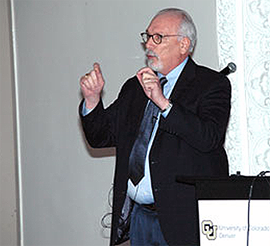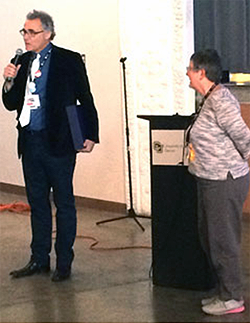MOOCs and much more discussed at CU Online Symposium
While disruptive to traditional delivery models of education, massive open online courses (MOOCs) and other outgrowths of the technology revolution have diminished the "You Can’t" argument in higher education.
That was one of many thought-provoking messages delivered by Richard DeMillo, (photo at right) distinguished professor of computing and director for 21st Century Universities at the Georgia Institute of Technology, as a featured speaker at the 13th annual CU Online Spring Symposium on May 22. The event drew 132 faculty and staff to the Tivoli Student Union for a full day of interactive sessions — "Make an effective online lecture," "Take a look at Google Glass" and "Top technologies to watch" among them — focused on the needs of faculty teaching online. The two keynote speakers addressed where technology in education is headed.
DeMillo, author of more than 100 articles, books and patents, said he is fan of "charting the direction of historical arrows" in predicting what the future holds. Just as other industries have been profoundly affected by technological changes, so will education, he said.
One thing that has born out over the decades is an increasing IQ level of each subsequent generation. "Human beings process information very differently today than we would have 100 years ago" or even a generation ago, he said. "What we think of as acceptable, what we think of as attractive, what we think of as interesting in the classroom probably has very little relationship to what these students (of today) think of as interesting or attractive."
DeMillo said American universities, while still global leaders in research, need to adjust their approaches to teaching as they grapple with sustainability issues and a general public that increasingly has doubts about whether it remains a "social good" to support colleges and universities.
Universities that are embracing changes are seeing tremendous response. "Georgia Tech went from zero students taking MOOCs to 700,000 taking MOOCs in the course of 16 months," he said.
He noted that Benjamin Bloom, who coined the term "mastery learning" several decades ago, concluded that students' achievement levels would rise appreciably if mastery learning techniques were used rather than the "sage on the stage" approach.
"If you organize your classroom using technology — not to provide a remote, distance-learning experience where there's a videotape talking to a student sitting at a terminal — but to provide this interactive mastery learning setting, you can move everyone the way that Bloom predicted," he said. "... The thing I loved about the initial MOOC experiments was that they took away the You Can'ts. ... We can't do that because..."
Last year, the University of Colorado entered an agreement with Coursera, a leading MOOC provider, to explore using the platform in order to deliver better education opportunities to more students.
Higher education institutions will need to become more efficient, and probably slimmer, as technology and the way people learn continues to evolve, DeMillo said. "I remain a huge optimist on the possibilities that technology offers us. I think our institutions will change fundamentally," he added. It may take five years, a decade or even a generation for the changes to transpire, "but I think higher education will perform better as a result. ... What you're doing here is exactly the right discussion to have. It's great to see a university that is thinking very deeply about online education and what it means to the students."
The morning keynote speaker was Samantha Becker, director of the New Media Consortium's Horizon Report series, which analyzes emerging technology uptake in education sectors across the globe. Last year, she taught the first online course to exclusively take place on Facebook.
For the fourth consecutive year, the symposium presented its CU Online Innovation Award. This year's winner is Deb Kellogg (photo at right, with David Thomas), Ph.D., associate professor of the Business School. David Thomas, CU Online's director of academic technology, said CU Online pilots programs in order to help faculty in their teaching.
"Deb is one of those faculty members who is always willing to put her neck on the line for our experiments to see what will work," Thomas said.



